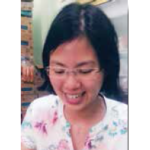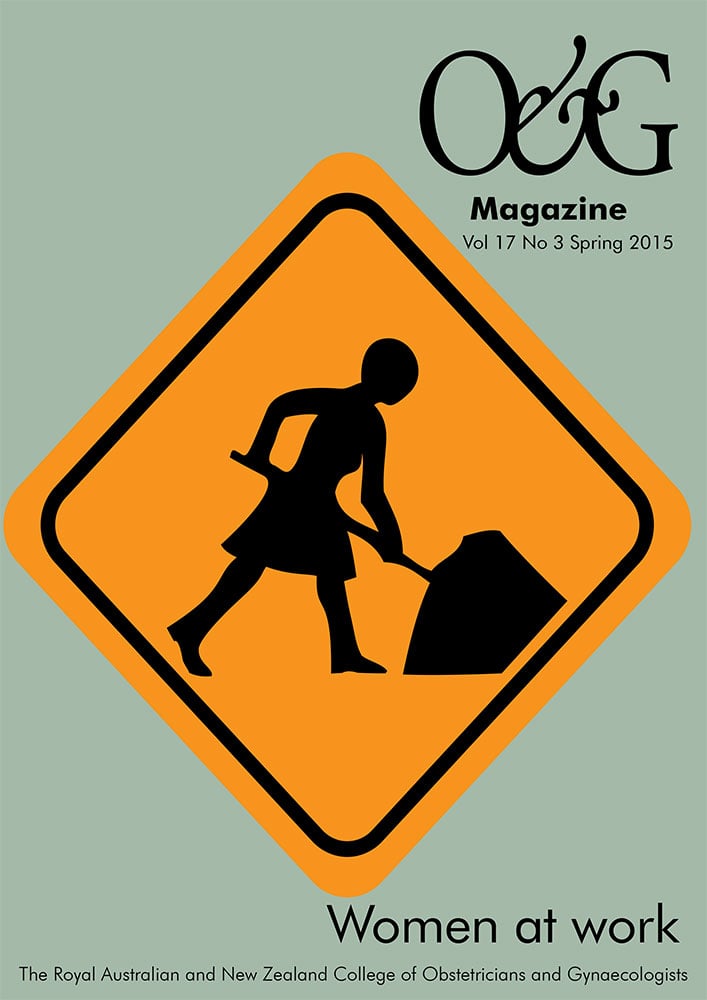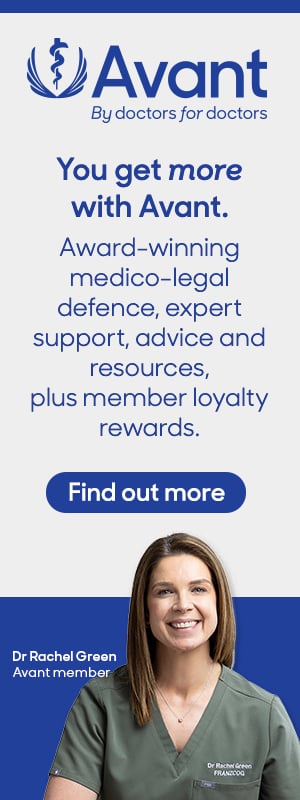Alexandra writes
I’ve just arrived home from a long lunch at one of the local wineries followed by a walk on the local beach and am now looking out the window at the cattle grazing peacefully on the green hills while sitting by the fire with my beautiful border collies. This is a rather typical day off from my part-time position at a nearby tertiary centre. My perception of success has certainly changed in the past year.
My current working lifestyle is not what I once thought it might be. I grew up in Melbourne and went on to university and clinical training at various hospitals around that city. During this time, I witnessed a strong change to favouring private group practice that seemed to allow a more balanced lifestyle and, it appeared, maybe having a family and a career in private practice might just be possible.
I was fortunate, before and during my training, to spend some time overseas in both developed and less-developed economies, seeing how things were done there. I had a brilliant year of training in Cork, Ireland, on the advice of one of my very wise bosses in the early years. I also had the chance to broaden my perspective with working trips to indigenous communities here and in Kenya and Mongolia. I did, however, continue on the path I had always imagined, training in Melbourne and striving to attain sound practice and professional relationships with a plan to eventually set up group practice and combine this with a part-time public appointment. I looked forward to embarking on the balanced lifestyle we hear about and yearn for during the busy training years.
I gained my Fellowship in February 2014, and commenced working in a part-time public post while pondering private practice. Life was ticking along and I loved the increased autonomy and quieter life after the very busy training years. Enter husband and an opportunity for him to run a winery in McLaren Vale. I resigned and moved interstate with no job. I started locuming at this point and it has been brilliant and enjoyable and I chose to keep doing it despite landing a part-time public post in the meantime.
Currently, my husband and I have established a farm in a beautiful part of the world, I have a part-time public post at a tertiary centre in town and I travel for locums, mainly through the Rural Obstetric and Anaesthetic Locum Scheme (ROALS), run by the College. The locums afford me the opportunity to experience new people, places and practices, while giving the amazing rural practitioners some time to breathe. I particularly enjoy working with Indigenous patients in various parts of the country – a passion I have always had and am thrilled to be tapping into again. It is truly the best of both worlds, combining travel and locuming with a public post.
In the public post, I have been blessed with a wonderful boss who is supportive of the women at work and, importantly, having a public post keeps one accountable and up to date, while also allowing for development of fantastic professional relationships and friendships. In our spare time, my husband and I enjoy our working property, running cattle and striving for self-sustainability with our chooks and veggie patch. I am still pondering private practice and adding that to the mix. Life is sweet – it’s relaxed, it’s wholesome, it’s diverse – and it’s fun.
Upon reflection, I feel it is vital to take opportunities to work in different environments and systems and thus discover what works for you both personally and professionally. On my journey I have been blessed with fantastic bosses who have been wonderfully supportive and terrific mentors, particularly in my transition to consultant and again in my transition to my work-life balance as it is today; they have made my journey to a happy, successful, balanced lifestyle possible.
Kae writes
When the call came through to ask if I would write a short piece on flexible work patterns, I was in the middle of trying to rescue a pot of pasta from bursting into flames (Bridget Jones style). The follow-up email stated the intention of this issue of the magazine is to look at various women in their careers and how they may differ rescue a pot of pasta from bursting into flames (Bridget Jones style). The follow-up email stated the intention of this issue of the magazine is to look at various women in their careers and how they may differ from the old stereotype; because they have different needs and requirements to the classical male obstetrician and gynaecologist of the past. My name was picked out of the hat, I understand, because I have previously participated in the Rural Obstetric and Anaesthetic Locum Scheme (ROALS) and, therefore, have clearly availed myself of a flexible work pattern.
As I found myself agreeing, I was asked if I had a family. I knew exactly what was being asked, but could not find an accurate, concise reply. Of course I have a family, but what was meant was a partner and children, then no, I didn’t. ‘Oh well, you know, flexible working hours are so beneficial when you have to bring up a family,’ came the reply. I very nearly said – but refrained, because I didn’t want to sound ornery – but they are also very beneficial for people predisposed to an indolent lifestyle!
I do not believe in the existence of a stereotype, really. If there is such an entity as the ‘classical male specialist of the past’, I have not encountered him. Instead, I have met quite a few male specialists of an almost bewildering range of personalities and characters. Dr X, who used to do on-calls at the busy tertiary hospital I trained at, was an award-winning baker at the local agricultural show and did not, I was told sternly by my senior registrar, tolerate any Trainee who could not do a good double-handed knot. Dr Y has an open, jolly countenance, lives in a contemporary, fancy city apartment, is closely involved with his family, loves travel and good food and is wonderfully generous in his teaching of registrars. Dr Z is a benign gossip, such that theatre lists with him always float past very quickly. He has continued to do gynaecology clinics long into the sunset – the caesarean section rate, when he was a young consultant, he says, was four per cent. Dr A has travelled the tropics working in busy hospitals, spent decades at tertiary institutions in Australia and maintains a keen academic interest.
I cannot see how all these men would have a uniform set of needs and requirements. Indeed, their career paths have varied, I suspect, because they have tailored them to their specific needs. I like to think that life ought to be tailored also to desire and not mere need. Happy is the person who finds a convergence of need and desire, of course, and if my own story demonstrates anything at all, I hope it shows that registrars can do what they need and want at the same time.
Flexible work patterns should be contemplated by all members of our speciality, men and women alike. Engaging with women and babies at the most critical times of their lives is – in my sentimental opinion – a privilege of the highest order. No one ought to take on this work without intentionally wishing it and ordering one’s life to suit is mandatory. I would never want to be an obstetrician and gynaecologist living any sort of work pattern by default. A non-purposive lifestyle cannot be conducive to the sort of excellence we should be aiming for. Therefore, I will continue to arrange my days as best as I can, to match my needs and desires and hope this coincidentally may achieve some sort of advantage to society.
My route thus far has been this: I spent my first two years of training at a solid tertiary institution in Melbourne, having never worked in obstetrics (or gynaecology) before. My third year was in country Victoria, at two separate regional hospitals boasting incredibly supportive, lovely consultants. Then I took a year off training, spurred by a terrible itch to see the world and specifically explore how very-low-resource settings might grapple with maternal-fetal health. I had the great fortune to meet a couple of people who facilitated my volunteering for short stints, first in Papua New Guinea then Vanuatu. In between, I finished off a Master of Public Health I had begun during internship. I then returned to my tertiary hospital.
When I informed the hospital management of my intention to take my fourth year off training, I was asked to reconsider my decision. There was a cursory inquiry into what I intended to do and the repeated warning I might not have a job to come back to, despite my making it clear I did not expect this security. I was advised to avoid that risk. This experience reminded me that training registrars are often seen, first and foremost, as service providers.
It also, I confess, made me wonder at how different it would have been if I had intended to take time off for family reasons. I celebrate how far our College has come in recognising that Trainees ought to have their childbearing needs catered to and also, more generally, in its approach to training flexibility. Surely, however, hospitals should provide similar levels of flexibility rather than focusing on the service delivery needs and potential for inconvenience.
Despite all, I was received back into my hospital readily enough for my fourth year. Then I went to Far North Queensland for a year as an outreach registrar; an experience I enjoyed immensely. For my final year, I returned to regional Victoria, partly for the surgical experience, mostly for the pleasure of working in a very well-oiled, compact unit with inspiring bosses. Towards the end of my training, I found a position in sub-Saharan Africa with Australian Volunteers International and spent half a year working as a lecturer and hospital specialist in Malawi. Just before leaving for Africa, I worked a few months locuming as a fledgling consultant in the unit where I’d been the senior registrar, feeling well-supported throughout. Since my return from Africa, I have done a few locum stints, and plan to settle down to a generalist position in the near future.
As described above, my entire career has been tailored to my needs and desires and has been hallmarked by flexibility. I have always harboured an interest in public health and have been able to explore this both academically and in clinical practice. I love seeing patients and working with my colleague doctors and midwives, but, equally, I crave time off to explore all that life has to offer. I plan to maintain a four-day work week for the rest of my career and am grateful every day that ours is a profession that will permit such indulgence.







Leave a Reply